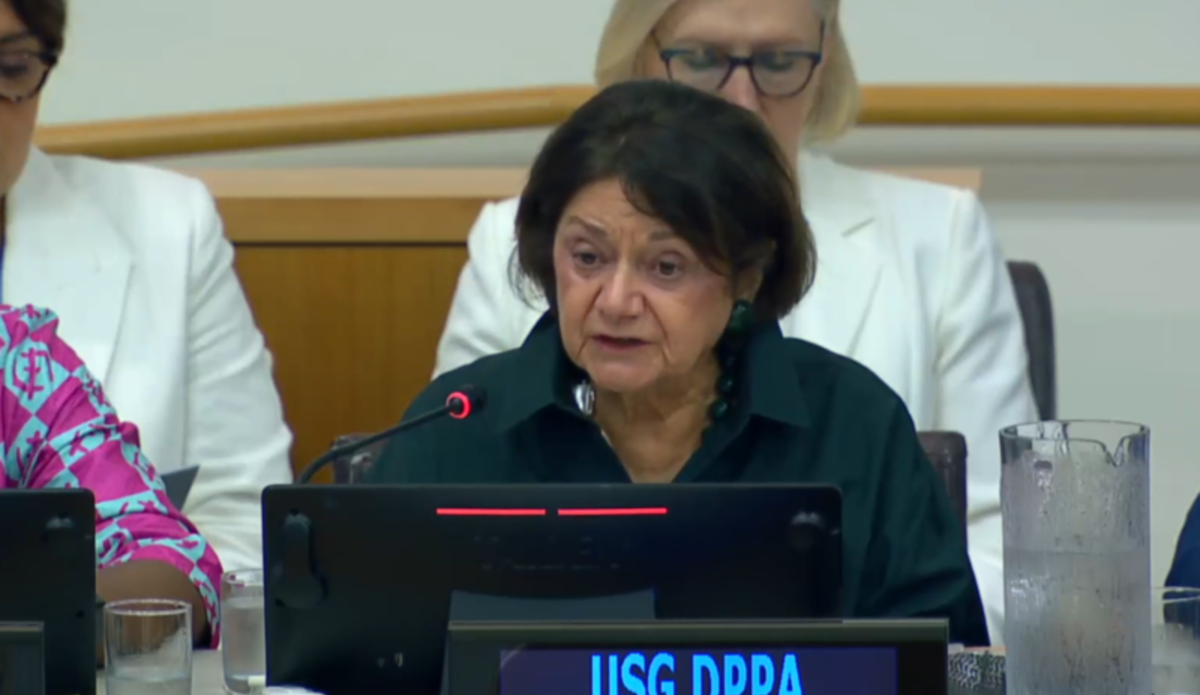USG Rosemary DiCarlo's Remarks at the
Peacebuilding Commission Ministerial-Level Meeting on Peacebuilding and Sustaining Peace
New York, 22 September 2023
Mr. Chairperson,
Excellencies,
It is a great honor to be among you to speak on the Secretary-General’s policy brief, “A New Agenda for Peace” and the role of the Peacebuilding Commission.
I would like to thank you for this opportunity and commend the Chair of the Commission, Croatia, for initiating this meeting. This high-level gathering could not be more opportune.
In his opening address to the General Assembly on Tuesday, the Secretary-General’s message was clear: the multilateral peace and security architecture is under unprecedented strain, and we need a new and innovative approach, based on current political realities.
Indeed, we are witnessing the highest level of tensions and major power competition in decades, coupled with a persistent and growing loss of trust between the global North and global South. Meanwhile, a series of massive threats – from the climate emergency to the weaponization of new technologies and rising inequalities – demand urgent and united action.
A New Agenda for Peace is the fruit of a deep and broad reflection on how Member States can arrest deepening divisions and find avenues for cooperation and collective action. Our goal is to present a unifying vision for peace and security – one that is clear-eyed about the magnitude of today’s challenges, and which addresses the concerns and priorities of different constituencies.
For these reasons, A New Agenda for Peace offers an extensive narrative of the current global moment, the transition towards a more multipolar global order, and what it means for multilateral action for peace.
The Secretary-General’s vision for a more effective collective security system is grounded in a recommitment to multilateralism, based on the UN Charter and international law, and in line with the principles of trust, solidarity, and universality.
At the center of this vision is a call on Member States to re-engage in diplomacy and to prioritize conflict prevention and peacebuilding. Comprehensive approaches, political courage, effective partnerships, sustainable resources, and national leadership are required.
Above all, greater trust – among Member States, among people and in the institution of the United Nations itself – is essential.
A New Agenda for Peace makes the case for a new approach to conflict prevention and peacebuilding consisting of three parts:
First, it recognizes that the scourge of violence affects lives and livelihoods not only within but also outside of armed conflict settings. Drawing on SDG 16.1, A New Agenda for Peace calls on Member States to reduce all forms of violence in their societies.
Second, the Agenda approaches prevention as a universal goal in which all Member States should engage. Every country – not just conflict-affected or “fragile” States – faces its own risks of violence and conflict. The Agenda calls on all Member States to develop national prevention strategies and invest in national peace infrastructures.
Third, the Agenda underlines that prevention can only be effective if it is nationally led and owned. Yet prevention is often conflated with intervention and undercut by a lack of trust. A renewed commitment to prevention must address that lack of trust, respond to national priorities, and reflect the concerns and aspirations of all sections of society, with the support of the international community, when requested.
Excellencies,
A New Agenda for Peace recognizes that the current structures of global governance have become anachronistic and must be updated to reflect 21st century political realities.
It proposes a series of reforms to United Nations intergovernmental bodies, including the Security Council and the General Assembly. As part of this vision for a more effective collective security machinery, it also calls for a stronger role for the Peacebuilding Commission.
Allow me to recall the key elements of the Secretary-General’s proposal regarding the Peacebuilding Commission:
- For Member States to use the Commission as a key convener for discussions on issues that lie at the nexus of peace and development, such as inequalities, violence, and conflict; the importance of the 2030 Agenda for prevention and peacebuilding; and the linkages between development, climate change, and peace.
- For the Commission to establish a dedicated mechanism to garner political and financial support for the implementation of the national and regional prevention strategies called for in the policy brief. In this latter respect, increased formal participation of regional organizations in the Commission would be critical.
I look forward to a successful conclusion of the Fifth Committee deliberations on assessed contributions for the Peacebuilding Fund in its next session.
The 2025 review of the peacebuilding architecture will be a vital opportunity to act on the recommendations contained in A New Agenda for Peace, and the outcome of the Summit of the Future.
Excellencies,
Your participation in today’s proceedings – as Commission members and countries on the Commission’s agenda - is further demonstration of your strong commitment to investing more in prevention and peacebuilding, as called for in A New Agenda for Peace.
You have a unique opportunity to discuss proposals for strengthening the Commission as a critical convener for effective and sustainable peacebuilding action.
I wish you successful deliberations. I pledge the support of my department (DPPA) and the United Nations Secretariat to help you realize your ambitions.
Thank you.

